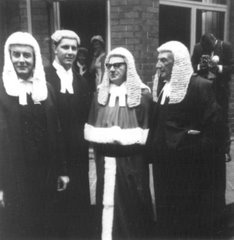Akshay's list is terrific -- a great topic, and fascinating-sounding selections (I say that because, not in spite of, having read only one of his ten honorees). Is it thunder-stealing, or thunder-appreciating, to offer a mini list of my own? I hope the latter.
5. William Gilmore Simms, The Scout. If you don't count Poe -- and there are good reasons for not counting Poe -- Simms is the dean of antebellum Southern novelists. I know, I know, that's like being the dean of Burmese gangsta rappers. But I enjoyed this Revolutionary War novel significantly more than anything historical by Fenimore Cooper, Simms's Northern model in the genre.
4. Victor Hugo, The Hunchback of Notre Dame. This is my version of The Shogun -- I read it at 14, loved it, and don't care to know if it's actually just gassy romanticism.
3. William Styron, Confessions of Nat Turner. Styron's version of the Turner rebellion was historically and politically controversial (OK with Eugene Genovese, not OK with certain black activists), but it works for me. Having read some of the academic history about Turner, I'd have to say this is another example (like Vidal's Lincoln) where brilliant, thoughtful fiction totally outshines workmanlike historical scholarship.
2. John Updike, Memoirs of the Ford Administration. Really a book-in-a-book -- Updike's narrator is an oversexed history prof in the '70s, writing a fictional life of James Buchanan. Both books are good, and Updike's quasi-defense of possibly The Worst President In History is surprisingly compelling.
1. Robert Graves, I Claudius. Along with its sequel, Claudius The God, this is endless fun. A sharp, distinctive, enduring take on all the personalities of the early Empire (partly lifted from Suetonius, but that's OK). Better than HBO's Rome, and I liked Rome. Has anyone read anything else by Graves? He has a 400 page novel on Belisarius which sounds pretty great.
Honorable Mentions:
* William Faulkner, Absalom, Absalom. Is this a historical novel? Sure, John C. Calhoun and Robert E. Lee don't make appearences, but this book IS the antebellum South. That should count for something. And if it does count, it has to be #1.
* William Thackeray, Henry Esmond . Surely THE WORST historical novel I've ever read. I loved, loved, loved Vanity Fair, but this -- supposed to be Thackeray's #2 or #3 -- is dry, stilted, and repetitive. Wikipedia says it's about the Jacobite rebellion, but I swear I've forgotten everything about this book. A shame, because the sequel, The Virginians, sounds promising on paper. But after that nightmare, I'm not gonna bite.
Wednesday, November 7, 2007
Subscribe to:
Post Comments (Atom)

No comments:
Post a Comment